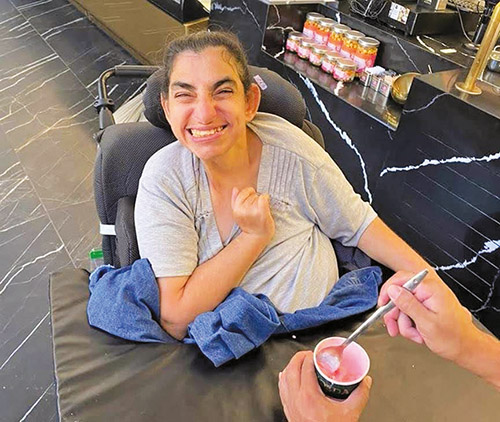

As a kosher foodie living in Israel, I am intimately familiar with the ever-potent power of novel and nostalgic comfort food.
Within minutes of hearing about the newest offerings at our favorite restaurants or the childhood treats that clandestinely crop up on our grocers’ shelves, Israel’s Anglos hunt them down with alarming alacrity. All at once, nothing seems more important than satiating our sentimental sweet tooths or sampling a kosher version of a formerly sinful taste combination.
But as a disability advocate, I wonder why more people don’t pursue inclusion—the ultimate societal soul food—with the same intensity.
Perhaps they don’t realize that this delectable dollop of untainted humanity is infinitely more satisfying than even the most exclusive gastronomic delight. Maybe they are unaware that this slice of solidarity promotes physical, mental and emotional wellness for all involved and even boosts businesses’ bottom lines. Most likely, it’s just that inclusion isn’t on their radar at all.
This is a sad reality that must change if we are to truly progress as a society.
To make this happen, we must help the masses appreciate the intrinsic and potential value of inclusion. We as a civilization must internalize the bountiful benefits that flow to the many through the empathetic advancement of the few. In short, we must love, crave and adore inclusion at least as much as our favorite comfort foods.
What would this look like? While foodlust is far from unique to Israel’s eclectic expats, I was recently at the epicenter of an ice cream-related incident that perfectly illustrates the visceral fervor we’ll need to inject into the collective psyche in order to right our inclusive ship.
After years of lackluster offerings, Israel’s ice cream industry is finally picking up the pace, and immigrants from around the world have abundant options for sampling a sweet taste of home. That is, unless you’re a fan of mint ice cream.
To the average Israeli, adding mint flavoring to ice cream is such a nonsensical idea that even the country’s most adventurous parlors and purveyors have refused to consider it, no matter how passionately their North American customers have pleaded the case. Every once in a while, there will be a Sasquatch-style sighting at a creamery willing to humor this dubious demographic by making a single batch, but these flickers of false hope just make it harder on the flavor’s faithful fans.
It is for this reason that my mid-January Facebook post about procuring ‘Mint Chocolate Cookie’ ice cream took on a life of its own. Within just a few hours, the post garnered tens of likes, and nearly 100 gobsmacked commenters begged the question, “Where?!” For a moment in time, I was the Mint Messiah, and my family, friends, colleagues and acquaintances looked to me for enlightenment.
Each posted comment became a full-fledged thread detailing the ice cream’s hourly availability at a litany of local merchants. When a shipment was depleted (a process that occurred with rapidity in real time), those still in the hunt pressured proprietors to order more and reported back to the group with information about the next delivery. A desperate few even texted and called me directly to see if I could help them procure a pint. It was absolute minty madness.
I had never seen or experienced anything quite like this before, and it got me thinking about the kinds of gratification we seek and this episode’s juxtaposition to Jewish Disability Awareness, Acceptance and Inclusion Month (JDAIM), a platform to raise disability awareness and highlight inclusion, equity and access as Jewish values.
With JDAIM now upon us, a single sentiment echoes in my mind: If only we all screamed for inclusion the same way we do for ice cream. While it might feel like a long shot, the potential is certainly there, as there are already those among us who feel exactly this way.
I believe that the deep-seated emotions that gave rise to the ice cream incident can be interpreted as both an unbridled love for that which makes us happy and a desire to take hold of something scarce. After well over a decade working for ADI, an organization that cares for and empowers the most vulnerable members of Israeli society, I can’t think of a better way to describe how my colleagues and I relate to disability care and inclusion.
Just ask anyone who works or volunteers with the disability community, and they will unabashedly tell you that the experience affords them so much more than they could ever give in return. They will also note that they’ve never been happier doing anything else and can’t ever seem to get enough. In addition to empowering others and making every individual feel valued and accepted, disability inclusion provides a bottomless “pint” of satisfaction, fulfillment and happiness to all those who practice and promote it.
As this month’s special moniker suggests, the key to harnessing this force for the greater good is a strong foundation of awareness and acceptance. It’s all about putting it on our collective radar and ensuring that it remains a priority. Only when we as a society recognize disability as the great human unifier, accept accessibility as the norm and seek out every opportunity to lift up others through acts of empathy, forethought and kindness, can we truly live the sweet life.
Elie Klein is the North American director of development for ADI (adi-israel.org), Israel’s most comprehensive provider of residential and rehabilitative care for individuals with severe disabilities and an international advocate for disability inclusion, equity and access.








